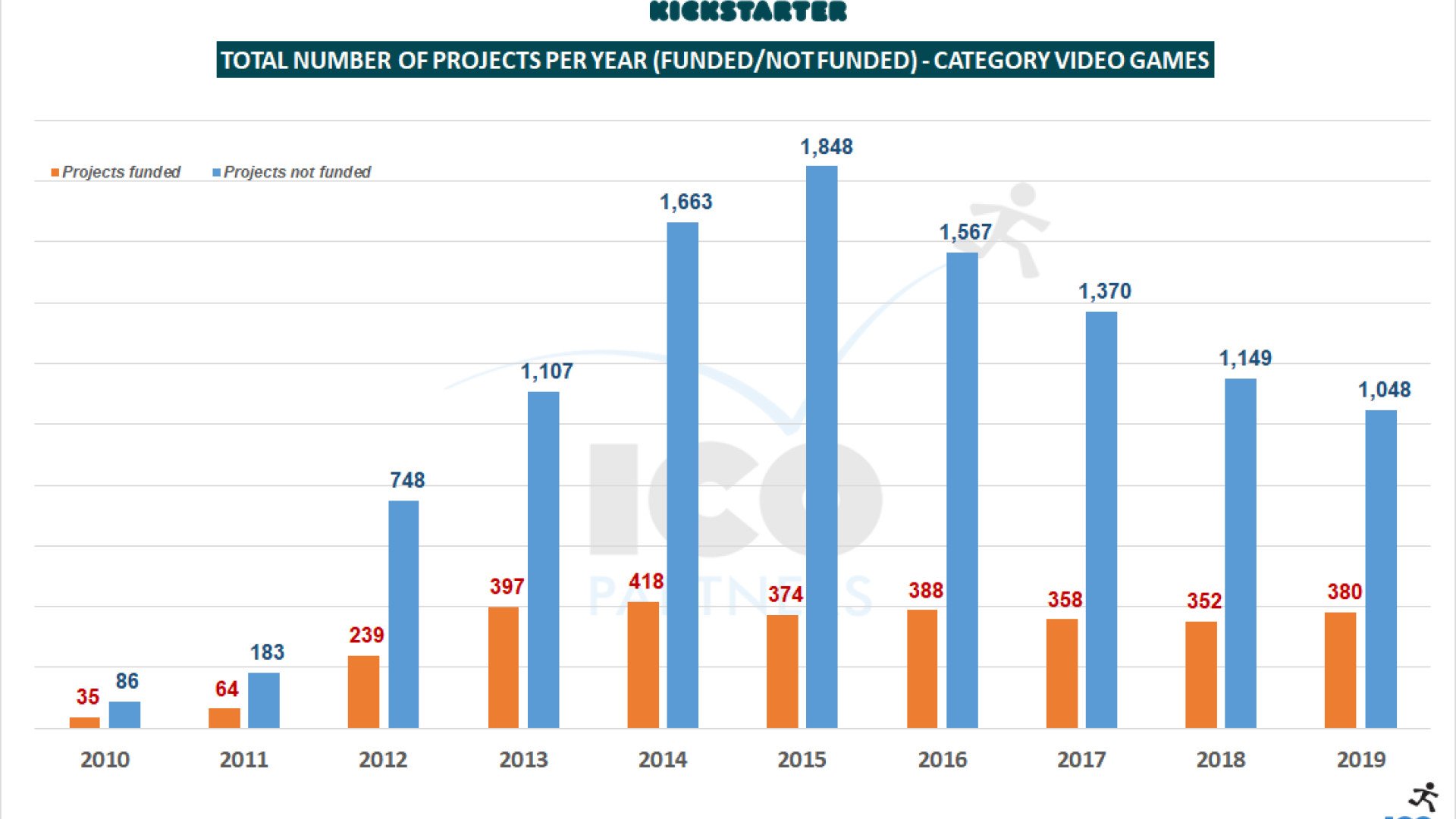
Hello there folks!
Today we're going to go for something a little different, with less focus on the game itself and more on Solasta as a project. Back in September, we were contacted by quite a few indie devs asking questions about Kickstarter. How can you make it work? How do you bring more people onboard? What makes a successful Kickstarter? If you too are curious about this topic, you just came to the right place because we're about to share what we learned from our own campaign.
Unfortunately I won't be able to share with you the secret recipe for success because... it probably doesn't exist. As much as we want it to, there simply is no failsafe method to run a successful Kickstarter Campaign when you're a small indie studio. Well, that was a short article... More seriously though, while you can't guarantee anything, you can certainly increase your chances.
Preparing your Campaign
Running a proper Kickstarter Campaign takes a lot of work - especially if you're a solo dev. Aside from creating your Kickstarter Page Description and Project Image, you're going to need a video and a good amount of visual assets from your game. But most importantly, people want to see gameplay - you're making a video game after all! This is not to say that you shouldn't share your gorgeous concept art, but if that's the only thing on your page you're going to be in trouble.
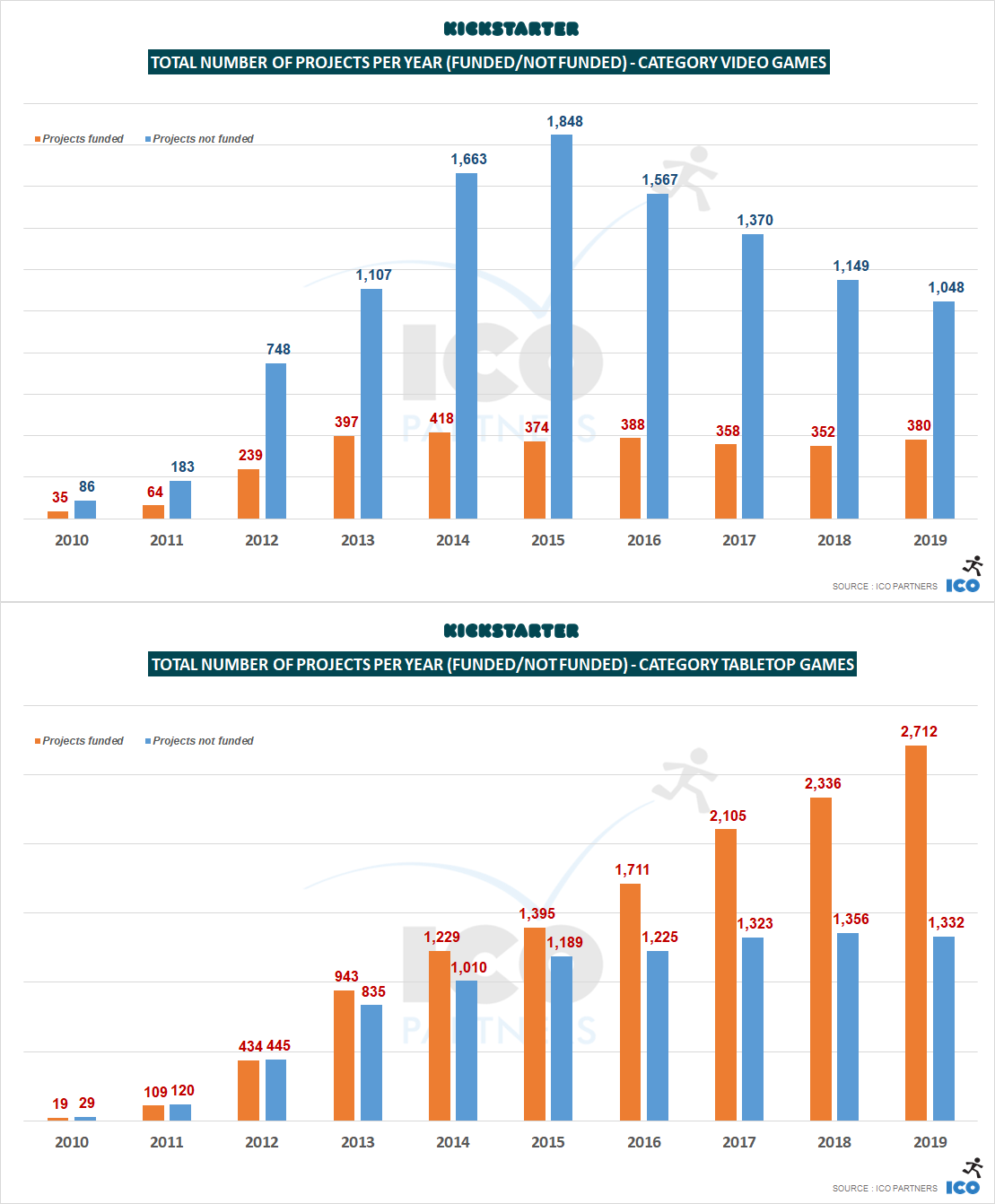
Kickstarter projects funded, Video Games (above) / Tabletop (below), courtesy of Thomas Bidaux (ICO Partners)
And for good reasons too; there has been plenty of successful video games on Kickstarter that just... never released. Whether due to malice (scam projects), mismanagement (money not properly put to good use) or bad planning (the amount was never enough to finish the game in the first place), Kickstarter backers have been burnt in the past when it comes to video games. This is notably why the Tabletop section of Kickstarter is much more successful than the Video Game section - the vast majority of Tabletop campaigns already have a fully playable and complete game, oftentimes playtested at a few Conventions beforehand. They just need to use the money to manufacture the game, the risk of not receiving your reward is low risk outside manufacturing or transport issues. Video games, on the other hand, are more risky - the complete game doesn't exist yet, and may not ever be finished. And even when it does, you run into issues like heavy delays (up to a few years for some project...) or more recently switching from Steam to Epic Game Store.

Even with large projects like Shenmue 3, backers are still at risk of a bad surprise
Anyway, back to the topic! Point is, for Video Games you're going to have to work hard to convince people. You need screenshots, gifs, anything that can show the "real game" to your potential backers. In the case of Solasta, we created a public demo for our Kickstarter campaign, which both served as a way to reassure people that the game really exists, and to have them experience the gameplay and send us feedback. And if you're a game dev, you already know - making a clean demo build can be very time consuming.
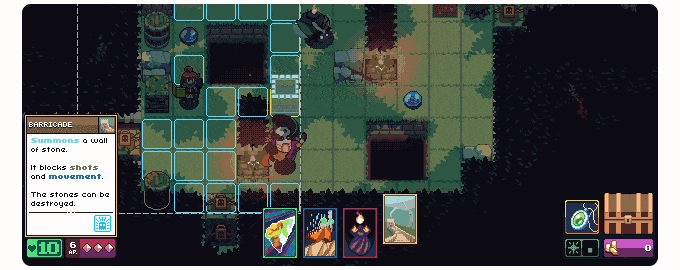
For instance, Dungeon Drafters has this nice little gameplay gif at the top of their page
So to summarize, you need to take time to take screenshots, make gifs, have a demo ready (if you can), write up the Description Page, have a Project Images that makes people want to click on it, make a video with gameplay... Time that you're not spending working on your game! And that's before the campaign even started. Oh and if you don't have any gameplay to show... you're probably way too early in your project to run a Kickstarter Campaign.
Communicate Ahead - Way Ahead!
Launching a Kickstarter Campaign doesn't mean people will suddenly flock to your project. It is estimated that only 30% - 35% of the pledges come from Kickstarter users, meaning 65% - 70% come from your own community. No one ever heard of your project before you launch your Kickstarter Campaign? Well, miracles can happen but... do you really want to rely on one?
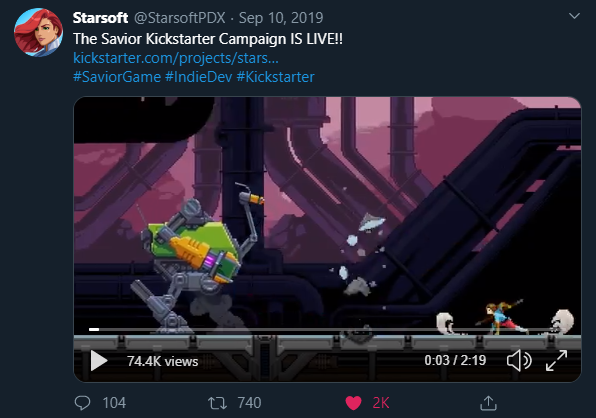
The team working on Savior had some very nice videos & gifs on Twitter to announce their Kickstarter
The gist here is that you should communicate about your game way, way before even considering Kickstarter. Twitter, Facebook, Reddit, Discord, Instagram, Youtube... whatever you feel more comfortable with (choose a few and stick to those, you probably won't have the time to do everything). You might see that as time you're not spending developing your game, but if you're thinking of going to Kickstarter it means you're trying to grow your community. And you can't grow something from nothing, you need to have a community to start with. Oh and when I say communicate, I don't mean going to other game devs servers uninvited and advertising your project. Please don't do that, it's both rude and unprofessional - and it doesn't paint a good image of yourself or your game. Create your own spaces, share your work in places that welcome it, engage with those who are curious about what you just showed them.
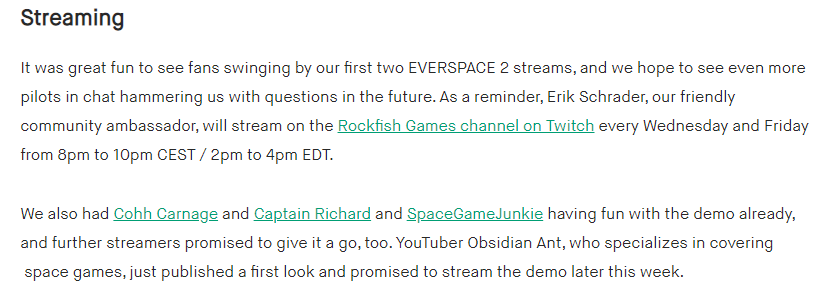
Everspace 2 had quite a few streamers lined up to play their demo, giving quite a nice visibility boost
And try reaching out to game journalists and websites with a short gameplay video (from the one you prepared for Kickstarter), or influencers you may know - it can only help. At worst they won't answer or gracefully decline, no harm no foul. And at best? New friend! :D
Money, Spreadsheets & Planning
A lot of people hate talking about money. Video game is a passion after all! We shouldn't be there counting coins! Yet if you don't prepare accordingly, you might just end up being another game dev unable to finish his project. You know the saying, "the road to hell is paved with good intentions" - at the end of the day if you don't deliver your game, to everyone else it doesn't matter if you really tried hard. Well, the silver lining is that you probably picked up a lot of experience so you'll have better chances next time!
Anyway, you need to sit down, think and plan. How much time do you need to finish the game? How many people do you need to help you, on what you can't do yourself like music or art? How much more do you realistically need? I've seen projects that asked for so little it would barely pay for a single person's salary for more than 3 months. Now don't get me wrong, there's nothing wrong with that if you have other sources of funding (which you hopefully have) and that Kickstarter money comes to ensure that you can make it to the goal. In fact, it is extremely unlikely that the money raised through Kickstarter alone would be enough to pay for your project, so don't put all your eggs in a single basket. But on the other hand, don't ask for too little - else you might not be able to finish your project, or people may believe you aren't able to scope your own project properly.
Once you have a number in mind, check out how other Kickstarter projects that are similar in scope to yours did. A little sanity check is always important to make sure you're still in line with reality. Look at the price of their tiers, look at how many backers they had... And make a quick mental note of what the goal you have in mind would imply. If my backers paid an average of X USD, how many backers would I need to reach my goal (and vice versa)? Adjust these numbers until they seem realistic enough - backers won't pay an average of $100 for your project (at least not in video games), and you won't manage to get 20,000 backers out of nowhere either. If you feel like you're going nowhere, your goal may be too high - meaning you need to find money from other sources.
At the end of the day, you should have a solid plan in mind before you launch your Kickstarter. What are your tiers, what are your rewards, how easy they are to implement in-game, how many backers do you need ad minima... Again, a lot of work that is not you working on your game.
Your Campaign is a Marathon... and a Sprint!
Alright, that title might sound a little confusing but bear with me for a second. You've just launched your Kickstarter Project, what should you be prepared for? Well, the first 3 days of your campaign are extremely important. This is your first sprint, you've got to make those first 72h count. Most successful Kickstarter campaigns make at least 30% of their funding goals in these first 3 days (although exceptions do exist). And those widely popular projects out there that make more than twice what they're asking for? They usually end with more than 50% of their funding goals by the end of the first 72h.
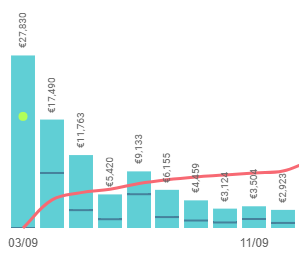
This is what Solasta's first week looked like, the numbers go down very quickly.
So prepare yourself and be present during that time. Answer to people's comments, write updates (at least once a day during the start), communicate on your Social Media pages... And try not to press F5 too often. The start of the campaign is often mentally taxing because you just know how much rides on these first days, so if you can have some friends or family help you relax by just dropping by for a chat, sharing a warm meal, downing a cold beer or just beating the hell out of each other on a fighting game - small things like this can help.
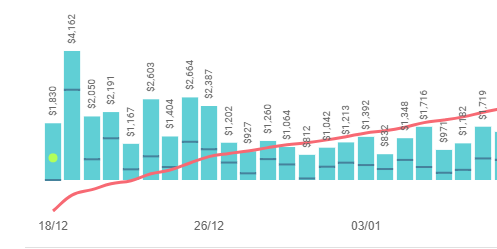
Zhelter is a rare counterexample to the 3 days rule, with numbers staying relatively stable
Now after those first few days are over, things are gradually going to slow down. You'll get less backers per day and that's normal. This is the marathon, where you will need to communicate regularly (at least once a week would be my advice, we did twice a week), keep an eye out for questions and comments that need answering - but otherwise you should go back to a more regular rhythm in your development schedule. Unless you put out a demo which needs fixing - that's a priority as you don't want your players to be commenting on game-breaking bugs when they should be focusing on the gameplay (minor bugs are okay, it's an early demo).

What happened on April 12th in the Prodeus Campaign? GmanLives published a video on the game on his Youtube Channel.
So... should you just let the ball roll on its own? If you're happy with how your campaign is going, you can. If you want more people to drop by, you should keep reaching out on Social Media and the likes. Maybe some game journalists could be interested? There might be some Streamers or Youtubers who specialize in your game's genre? Even if very few will play a demo because it's often too short to last for a significant portion of their stream, they might mention your project at some point. Most of the peaks in the middle of Kickstarter campaigns happen because of some huge announcement or a popular influencer suddenly picking up the demo, driving people to your page. In our case, this happened when we partnered with Critical Role for an episode of #EverythingIsContent.
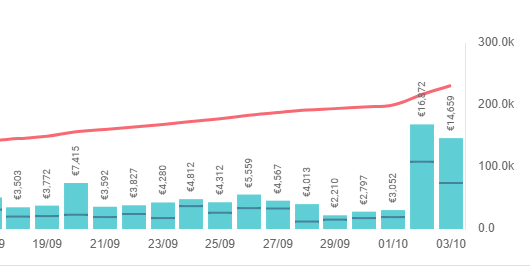
The last 48h of the Solasta campaign compared to the 2 weeks preceding it.
Alright, the campaign is almost over - now what? Prepare for your second (and last) sprint. See, when people check your Kickstarter page they can decide not to back immediately, and instead follow your project. And 48h before your campaign ends, every follower will receive a reminder email from Kickstarter! This means you'll suddenly have an influx of visitors who were already on the fence before, and if your campaign has been looking good so far (or is almost funded), chances are quite a few of them are going to convert into backers. If you look around on Internet, you can usually see creators talking about follower conversion rates ranging from 10% to 25%. Again, be ready, be present, and have a few cool updates in your pocket for the last two days (and one for when the campaign is over). It is important to note that if your project is far from getting funded at that point, it's very likely that this last push won't save you - people usually don't back a project that they feel will not make it.
What about Stretch Goals?
You made it, great! People really like your project, and you're going over your original goal. So... Stretch goal time? Stretch goal time! Before we continue, I want to be very clear: DO NOT EVER ANNOUNCE YOUR STRETCH GOALS BEFORE GETTING CLOSE TO REACHING YOUR FUNDING GOAL. If you do so, people may adjust their perception of how much you're asking for - instead of looking at the funding goal, they're already looking at the stretch goals. And that new, higher number may scare them away. Prepare a couple of potential stretch goals before you start your campaign - and for the love of everything that is holy, remain realistic. There has been plenty of great Kickstarter projects that promised the moon, and ended up going back on some of these promises - which is something that never feels good, be it for you or for your backers. That being said, if we're talking Stretch Goals, it means you're already successful, so congratulations!
Should I do Physical Rewards?
Ah, physical goods... everyone loves them. It can be hard to create different tiers if you don't have any goodies to throw to the mix, and usually this is also what makes Kickstarter interesting - you get stuff others wouldn't be able to get at release. But at the same time, I want to place a big, big warning on physical goods. First of all, making a physical copy of a video game is not easy. You have wrestle with certifications, manufacture, deals, transport... A lot of time spent, again, not working on your game per se. Second, if you go for the goodies option, you will have all the physical fulfillment to follow-up on. You will need to design the goodies, find manufacturing partners, decent price but good quality, transport partners to get them to different warehouses where they can be packed and shipped... All of that needs money, time, and knowledge. Do you know cheap yet good manufacturers when it comes to boardgames? I sure didn't. Thankfully we knew people in the board game industry who helped us out, but not everyone may have that advantage.

If you're still set on doing physical goods, check out Stonemaier Games' Kickstarter articles - they are great.
My personal take on physical rewards is: don't risk it if you don't have the manpower, time and money to spare. In fact, you may very well end up losing money instead of gaining anything on goodies tiers if you're not careful.
Special Thanks
At the end of the day, a Kickstarter Campaign is a great opportunity to make new friends who can help you out. I want to give special shoutouts to:
- Larian Studios, Obsidian Entertainment, Brian Fargo from InXile Entertainment, Spearhead Games, 6 Eyes Studio, Owlcat Games, for backing our Kickstarter Campaign and helping us out.
- Cohh Carnage, for backing our Kickstarter Campaign and joining Solasta as a guest voice actor
- Thomas Bidaux, for giving us copious amounts of tips and warnings about our Kickstarter plan
- Stonemaier Games, for writing some great articles on Kickstarter and physical fulfillment
- Victoria Tran from Kitfox Games, for inspiring us to write this article to help out other indie devs interested in Kickstarter
- Every single one of our backers and fans, and everyone else that I forgot to mention (really sorry if I did). You all helped making our Kickstarter Campaign a huge success!
I'm sure there are plenty of things I missed in this article as it's been more than half a year already, so if you have any questions don't hesitate to hit us up on our Twitter thread! We'll do our best to help :)
Article by Tactical Myzzrym